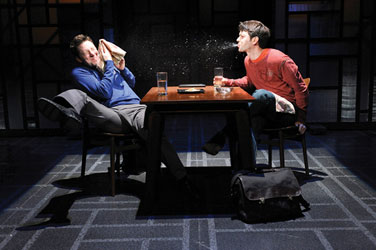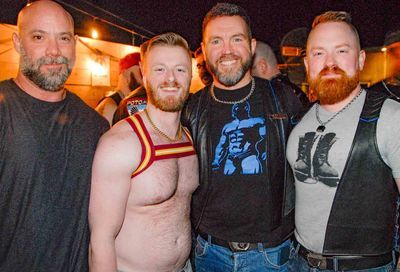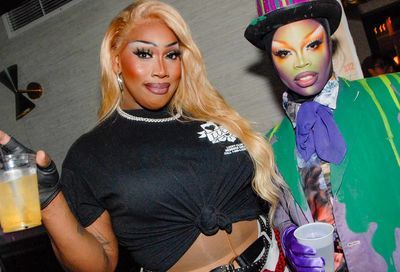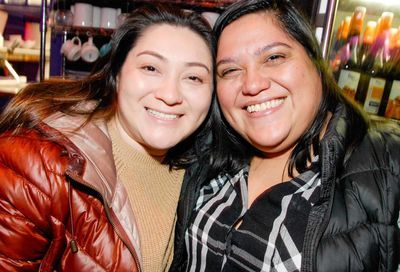Writers' Block
In The Four of Us, sentences go unfinished and people tend to talk at -- not to -- one another
The advantage to spending some portion of every day scanning blogs and Twitter feeds is that, sometimes, you stumble upon a question you’ve never previously considered.

Dan Crane and Karl Miller
(Photo by Stan Barouh)
A recent e-wander yielded the following thought: Has the evolution of communications technology created a situation where many of literature’s greatest devices no longer work?
Think about it. The missed connection would now be foiled by a cell-phone call or text message. Whether or not someone has really fallen in love or gotten engaged is probably pasted on their Facebook page. Electronic communication aside, even if an old school pen-and-paper letter has to reach someone immediately, any number of overnight carriers can not only ensure delivery, but confirm delivery with a recorded signature.
Juliet to Romeo: ”Not really dead. ;)”
Romeo to Juliet: ”ROFL.”
The lightning-fast speed and constant flow of words and thoughts and language are part of our every day. We have grown used to clipped sentences, abbreviated words and acronyms taking the place of complete thoughts.
This is how language works in Itamar Moses’s The Four of Us, now at Theater J. In the world Moses has fashioned, sentences go unfinished, exchanges pace briskly back and forth and, as with e-mail, people tend to talk at, not to, one another.
It’s a well-written play that, in terms of the athletic demands of its language, calls to mind Mamet or – for musical theater lovers – Stephen Sondheim’s breakneck ”Getting Married Today” from Company. There’s a life to the words being spoken, a demand for intuition and fluidity and spontaneity. Unfortunately, that rhythm is absent for most of Theater J’s production. While the two-person cast seems to warm into the material by the play’s closing scenes, the lack of spark and chemistry has already caused the mind to wander and interest to be lost.
Benjamin (Dan Crane) and David (Karl Miller) have been friends since they attended a young-musicians camp as teenagers. Dreams of becoming rock stars quickly faded as both turned instead to writing. Benjamin becomes a novelist, David a playwright. To celebrate the sale of Benjamin’s first novel, David has taken him to lunch. As David, still very much struggling to piece together a living as a writer, prepares to pay the check, he asks the question that changes everything.
How much did Benjamin make?
The play follows the two men forward and then backward, placing past and present alongside one another like bricks.
It’s in those opening moments however that the entire play balances. The danger is not that we should decide to either love or hate these two individuals, it’s that we might not care about them. It’s that what passes between them feels not like conversation but, instead, like dialogue. It’s like two actors passing words back in forth in an exercise to see what the English language is capable of doing.
Crane and Miller seem entirely distant from one another. Not in a fashion that causes one to feel the growing stir of envy or separation, but instead in a way that leaves one wondering if these two characters were ever really connected at all. Speaking about their friendship David says, ”I feel like I imagined it.” Perhaps he did.
For tension to build, we must first find compassion, and there’s none to be found. Instead, the audience is offered a series of brittle volleys that are largely uncomfortable and leave only a strange hollowness in their wake.
There are, however, moments where we catch a glimpse of what might have been possible. In one scene (which oddly and humorously culminates with the appearance of a large, pink stuffed animal) there was the almost physical sensation that both Crane and Miller had taken a long, deep breath and decided to start completely over.
We are finally able to see the vibrancy of the play’s writing and evidence that these two characters actually live in the real world. A place where emotion – keeping in mind that anger and hatred are as much emotions as joy, love and sorrow – and human connection are possible and present, a world made up of something more than perfectly rendered words trapped in a slightly apathetic game of catch.
But these are only brief, bright flashes in a show that quickly becomes cool to the touch and oddly vacant. A lovely, prolific flow of words that, without proper guidance and rendering, flood outward without purpose.

 and a half
and a halfTo Feb. 21
Theater J
DC JCC
1529 Q St. NW
$30-$50
800-494-8497
theaterj.org
That guidance should have come from director Daniel De Raey particularly because The Four of Us operates on a stage that is – though ingeniously conceived by scenic designer Tony Cisek – a largely blank canvas. Crane and Miller sit and talk. They smoke and talk. They sit while smoking and talking. They become, too often, static.
But in those moments when the actors seem pushed to animate, moved to energize the space between them and the canyon between stage and audience, they come brightly alive. The words come alive. The dynamic of Moses’s language becomes clear and vivid. David and Benjamin become, put simply, real.
In the end, The Four of Us stumbles because it shows that most curious of faults: When a show is wholly bad, entirely lacking, it is easily dismissed, we can walk cleanly away. But when a play gives us fleeting glimpses of success, of solid work and possibility, we can only wonder who it is that’s most deserving of a good talking to.
Support Metro Weekly’s Journalism
These are challenging times for news organizations. And yet it’s crucial we stay active and provide vital resources and information to both our local readers and the world. So won’t you please take a moment and consider supporting Metro Weekly with a membership? For as little as $5 a month, you can help ensure Metro Weekly magazine and MetroWeekly.com remain free, viable resources as we provide the best, most diverse, culturally-resonant LGBTQ coverage in both the D.C. region and around the world. Memberships come with exclusive perks and discounts, your own personal digital delivery of each week’s magazine (and an archive), access to our Member's Lounge when it launches this fall, and exclusive members-only items like Metro Weekly Membership Mugs and Tote Bags! Check out all our membership levels here and please join us today!




















